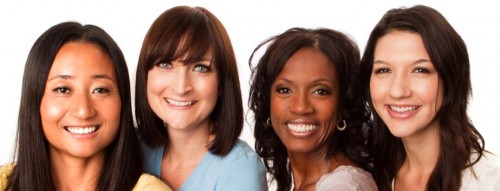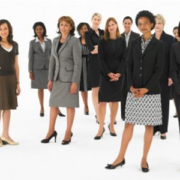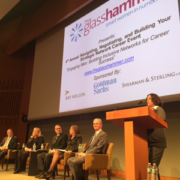Celebrating the sisterhood: the power of female networks
By Nneka Orji
Female friendships have always received perhaps more than their fair share of scrutiny; from frenemies to friends for ever, the spectrum of female friendships has been explored over the years. In their recent TED interview, actresses Jane Fonda and Lily Tomlin reflect on the “renewable source of power” which female friendships bring. Yet if it’s not the Queen Bee syndrome, society still leans towards finding some form of controversy in female relationships. Is this scrutiny justified?
As we celebrate this year’s International Women’s Day (#IWD2016 #PledgeForParity), it’s time to adjust the spotlight on female relationships to showcase the positive effects female-female relationships have had and continue to have on the journey to greater parity. The Canadian feminist and author, Nellie McClung said: “[w]omen are going to form a chain, a greater sisterhood than the world has ever known.” This chain – aka the sisterhood – manifests itself today in the form of female mentors, women’s networks and friendships. They serve not only to push the diversity agenda forward, but also to support women in overcoming those barriers that still exist and to promote women to ensure our societies reach their full potential.
Not just another talking shop
Although some dismiss women’s networks and events such as IWD as talking shops with no clear purpose and potentially detrimental to the inclusion of men in the debate, studies show the opposite. Turknett Leadership Group, a talent management organisation, published a study in 2012 which linked participation in women’s networks with “high levels of career-related social support, a greater sense of well-being and more positive attitudes toward the organisation or company for whom the woman works.”
Initiatives such as Sheryl Sandberg’s Lean In Circles serve to highlight the value some place on networking with other women – professionals and others. With over 26,000 Circles in 140 countries, women are engaging with each other in supportive networks across the globe. According to Sandberg’s Lean In website, 85% of Lean In Circle members “credit their Circle with a positive change in their life”.
As a result of the increased focus on diversity within organisations, leaders have invested more in gender-focused initiatives in the past few years. The added scrutiny organisations face as a result of reports such as the Lord Davies’ review in the UK, have led them to prioritise the gender inequalities – both real and perceived. Yet in their 2013 paper in which they shared the results of interviews within one global organisation, academics O’Neil, Hopkins and Sullivan found that there was a difference in the perception of the value of women’s networks in contributing to the organisation’s strategic goals. While the female network members felt that there was strong alignment between the network and the organisation’s wider goals, leaders in the executive teams “did not recognise the network’s possible effects on the firm’s bottom line”.
Out with the networks?
This idea on return on investment from diversity programmes and initiatives has been at the heart of the narrative – particularly across large corporates. However, according to a recent article in The Economist, organisations are starting to suffer from “diversity fatigue”. Diversity is becoming an over-used term and a tick-box exercise, leading to reduced levels of genuine engagement and more damningly, less significant impact on the sustainable change needed for a more inclusive culture. So should we tone down the emphasis on what remains a critical issue globally?
It is perhaps easy to fall into this cynical mindset; with the volume of articles such as this one and the number of women’s events (consider the number of IWD events you will come across), switching off may be the natural consequence of the increased focus on gender issues. However, it would be a missed opportunity to approach this important issue in such a passive manner.
Networks and networking are still important factors in career advancement, which in the long term should lead to the currently elusive goal of parity. Research has consistently shown that women network differently to men. Last year, Lily Fang of INSEAD published the results of her study which looked at the relationship between connections and career advancement across male and female colleagues. Despite being equally well connected, in terms of relationships with senior leaders and members of the executive team, female analysts were less likely to reap the rewards in terms of advancement than their male peers. However, the results did show that those women with a connection to a female executive outperformed those women with no female connection, albeit only marginally.
And it’s not just theoretical studies; examples abound of women who have been inspired, mentored and sponsored by more experienced female leaders. Oprah once told Barbara Walters during an interview: “Had there not been you, there never would have been me.”
Here’s to the sisterhood
Of course there will be situations where female colleagues don’t get along, in the same way that some male colleagues don’t gel. But why is there so much more coverage on the negative experiences of female colleagues and groups? Kelly Vallen’s experiences, which she shared in her book “The Twisted Sisterhood”, does resonate with a number of women. Yes there are “mean girls”, but there are “mean boys” too. The undue scrutiny on the former is misleading and detrimental to the general narrative around women in the workplace.
There are numerous studies which show that women do proactively support other women. A Catalyst report showed that far from pulling up the ladder behind them, 73% of women who are developing the next generation of talent, are focused on developing women.
In this enthusiasm to embrace the sisterhood, we must not forget the men. Some of the most committed sponsors of female leaders today have been or are currently being mentored and sponsored by men. Sheryl Sandberg and Larry Summers, Angela Merkel and Helmut Kohl. The role of men in achieving parity in the workplace and beyond is critical to success.
So this IWD, let us (men and women) celebrate the sisterhood – to keeping that chain unbroken and using it to pull up the next generation of women.











